The MSI MEG X570 Godlike Motherboard Review: Thor's Flagship
by Gavin Bonshor on August 28, 2019 12:00 PM EST- Posted in
- Motherboards
- AMD
- MSI
- 10G Ethernet
- Ryzen
- PCIe 4.0
- Ryzen 3000
- X570
- X570 Godlike
- MEG
System Performance
Not all motherboards are created equal. On the face of it, they should all perform the same and differ only in the functionality they provide - however, this is not the case. The obvious pointers are power consumption, but also the ability for the manufacturer to optimize USB speed, audio quality (based on audio codec), POST time and latency. This can come down to the manufacturing process and prowess, so these are tested.
For X570 we are running using Windows 10 64-bit with the 1903 update as per our Ryzen 3000 CPU review.
Power Consumption
Power consumption was tested on the system while in a single ASUS GTX 980 GPU configuration with a wall meter connected to the Thermaltake 1200W power supply. This power supply has ~75% efficiency > 50W, and 90%+ efficiency at 250W, suitable for both idle and multi-GPU loading. This method of power reading allows us to compare the power management of the UEFI and the board to supply components with power under load, and includes typical PSU losses due to efficiency. These are the real world values that consumers may expect from a typical system (minus the monitor) using this motherboard.
While this method for power measurement may not be ideal, and you feel these numbers are not representative due to the high wattage power supply being used (we use the same PSU to remain consistent over a series of reviews, and the fact that some boards on our test bed get tested with three or four high powered GPUs), the important point to take away is the relationship between the numbers. These boards are all under the same conditions, and thus the differences between them should be easy to spot.
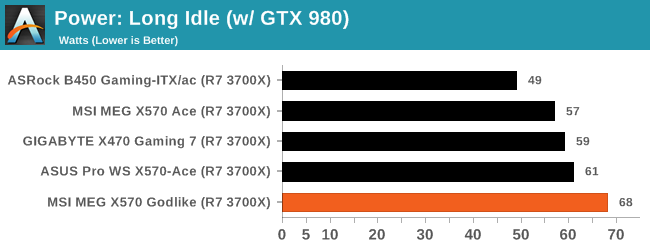
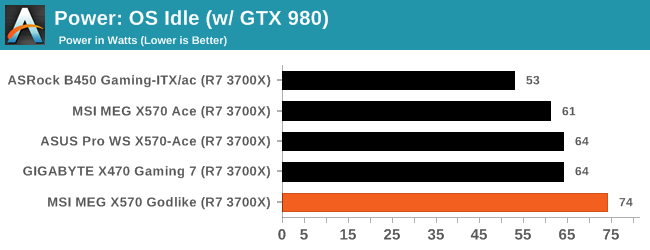
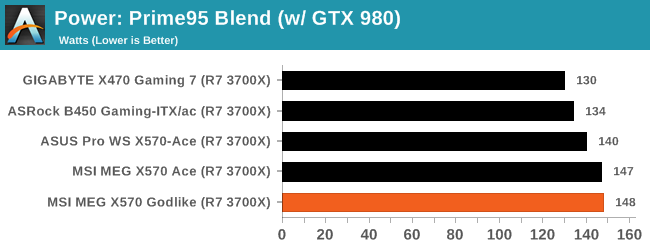
The power consumption at full load is marginally higher than the MSI MEG X570 Ace by a single watt, but in both idle and long ide power states, the power consumption is considerably higher. The larger PCB and bigger controller set are contributing factors.
Non-UEFI POST Time
Different motherboards have different POST sequences before an operating system is initialized. A lot of this is dependent on the board itself, and POST boot time is determined by the controllers on board (and the sequence of how those extras are organized). As part of our testing, we look at the POST Boot Time using a stopwatch. This is the time from pressing the ON button on the computer to when Windows starts loading. (We discount Windows loading as it is highly variable given Windows specific features.)
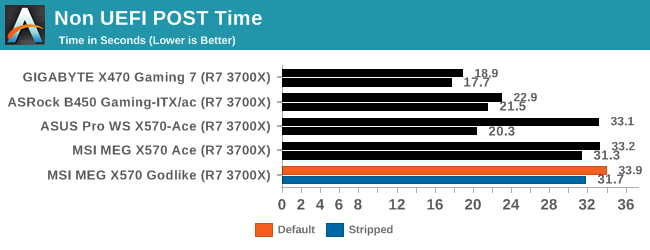
As with the MSI MEG X570 Ace model, the MSI MEG X570 Godlike also has extremely long POST times both at default settings and with controllers switched off. We did manage to make the POST time quicker by over two seconds by switching off networking and audio controllers, but this remains disappointing in comparison to other models tested with our AMD Ryzen 7 3700X processor.
DPC Latency
Deferred Procedure Call latency is a way in which Windows handles interrupt servicing. In order to wait for a processor to acknowledge the request, the system will queue all interrupt requests by priority. Critical interrupts will be handled as soon as possible, whereas lesser priority requests such as audio will be further down the line. If the audio device requires data, it will have to wait until the request is processed before the buffer is filled.
If the device drivers of higher priority components in a system are poorly implemented, this can cause delays in request scheduling and process time. This can lead to an empty audio buffer and characteristic audible pauses, pops and clicks. The DPC latency checker measures how much time is taken processing DPCs from driver invocation. The lower the value will result in better audio transfer at smaller buffer sizes. Results are measured in microseconds.
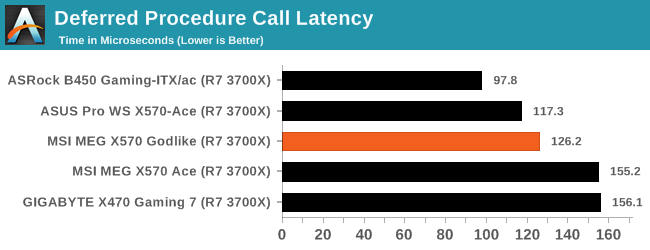
We test the DPC at the default settings straight from the box, and the MSI MEG X570 Godlike does perform noticeably better than the MSI MEG X570 Ace. The ASRock models do tend to have the upper hand when it comes to out of the box DPC latency.










116 Comments
View All Comments
Oxford Guy - Thursday, August 29, 2019 - link
"As far as security issues they have both had their own issues over the years, although Intel has had a fair amount more."I don't think so. Intel's recent security track record is abysmal when compared with AMD's.
Qasar - Friday, August 30, 2019 - link
Sweetbabyjays the savings you are referring to for the MSI and Gigabyte boards, guess where it goes, the the HSF to cool that CPU, and remember, a 50 or 60 buck cooler, isnt going to cut it. you will need to get a mid high, to a high end cooler to keep that 9900k running at 4.8 ghz. and BTW... so what if the 9900k can hit 4.8 or 5 ghz.. big deal.. the Ryzen cpus are performing with in a few % of the intel equivent cpus while being 600+ MHz slower, all because the IPC is better then intels right now, once the ryzen cpus get their clocks higher, the gap, could flip flop... clock speed isnt the end all be all in performance, IPC is.. and AMD, for the time being, has the better IPC."
Then you say in another comment "they've won the performance and value games both at once." i never knew 10% less performance is better." it is when, again, the 10% deficit, is also at lower clocks compared it intel, as again.. IPC is better
Irata - Thursday, August 29, 2019 - link
First of all, there are many lower price options for X570.And to add to this, a high end Z390 motherboard is not cheaper - you can actually even spend more and if high Ghz is your aim, that is what you will need. Plus a high end ($$$) cooling solution.
Sweetbabyjays - Thursday, August 29, 2019 - link
True there are many X570 boards for cheaper, which in my opinion makes this board in particular, pointless. Spending $700 on an AM4 motherboard is in my opinion pure stupidity.The Z390 Godlike motherboard is available for $100 US cheaper. So a product for product comparison. Additionally, there are many other Silicon Lottery QVL Z390's that you can purchase for literally 1/3 of the price of this board. Furthermore, you can overclock a 9900k to 4.8 on pretty much any Z390/370 board.
If you're planning on getting your 3700x to 4.2GHz, you're not going to get there with a stock cooler, so you still need an expensive cooler.
AMD's main game is to be the value for money competitor, what i'm saying is a $700 motherboard at AM4 level literally takes that advantage and scrubs it. The only time that Zen 2 CPUs become the value option is when you need more than 8c/16t, or if you're going to go with an older AM4 chipset.
AshlayW - Thursday, August 29, 2019 - link
Then we both agree that this motherboard is pointless. It is, 700 bucks on this is a stupid thing, but when a decent X570 is 150-200 bucks, no problem. 3700X+X570 is hands down the better solution (read: also for gaming builds) than the 9900K+Z390 when all is considered.AMD doesn't have to be the "Value for money competitor" anymore, hon, they've won the performance and value games both at once. Ryzen is a premium brand now, and just happens to offer better value also. 3950X will render Intel's entire HEDT completely pointless, and 3900X already does half of it.
Sweetbabyjays - Thursday, August 29, 2019 - link
I totally agree that 3900x and 3950x really are the final nails in the X299 coffin.AshlayW - Thursday, August 29, 2019 - link
Or you could be a Smart consumer and get a B450 + Ryzen 9 3700X, for the same price as the 9900K alone, and have 90% the performance in every single scenario and having saved over a hundred dollars, considering you didn't have to buy the cooler, also? Oh, and the socket isn't dead-end and actually has an upgrade path.AshlayW - Thursday, August 29, 2019 - link
Ryzen 7*Sweetbabyjays - Thursday, August 29, 2019 - link
"B450 + Ryzen 7 3700X" I agree, this is a much more logical approach for most gamers and content creators on a budget.Oxford Guy - Thursday, August 29, 2019 - link
I'm also wondering why people ALWAYS push the 9900K instead of the 9700K to gamers, when 8 threads is enough for games and will be for long enough.